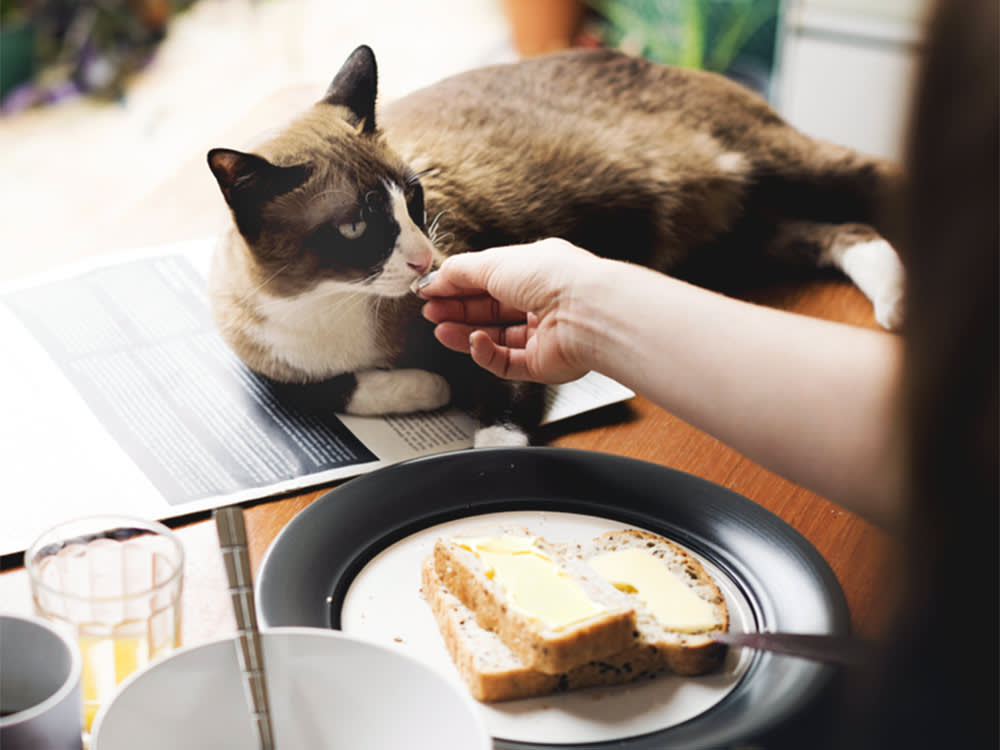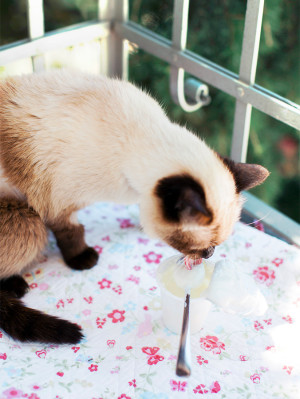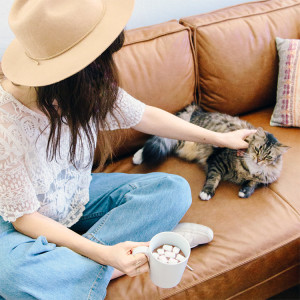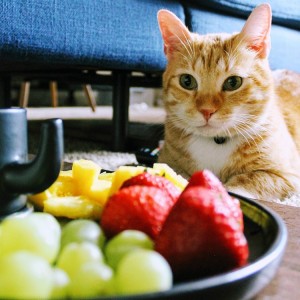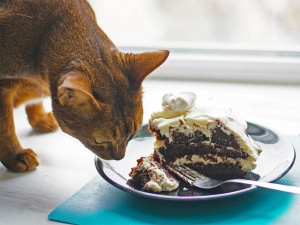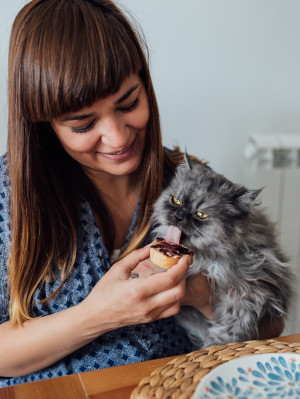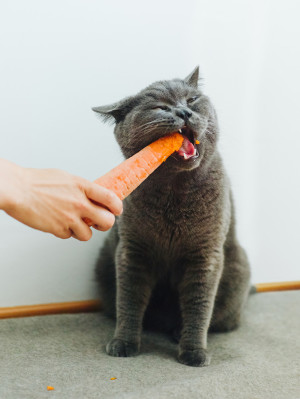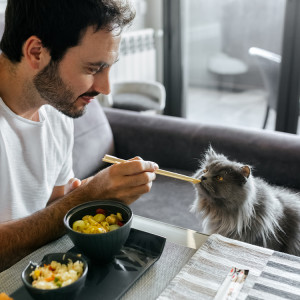Can Cats Eat Butter?
Butter isn’t toxic to your cat—but despite what they tell you, they really shouldn’t eat it.
In human food, butter is pretty much the foundation for anything remotely delicious. But should you share the buttery goodness with your cat? Can cats eat butter? No, cats should not eat butter. While butter isn’t toxic to cats, it can still cause serious digestive issues, depending on how much they eat. For more, we spoke with expert Dr. Rebecca Greensteinopens in new tab, Chief Veterinarian of Kleinburg Veterinary Hospital and a medical advisor for Rover, for tips on how to keep your cat safe around butter.
Can cats eat butter?
No, cats should not eat butter — but no need to panic if your cat sneaks a lick it.
“Butter isn’t toxic to cats per se, and, in theory, can be tolerated in extremely small amounts,” Dr. Greenstein tells Kinship. “However, just because small amounts could be tolerable, does not mean I would ever recommend including butter in your cat’s diet. Butter is an extremely fatty food without significant nutritional value otherwise for your cat.”
In addition to being high in fat, which is bad for cats, butter is also a dairy product, meaning it contains lactose. All cats are lactose intolerant and should not consume any dairy products. Like with lactose intolerant humans, cats can’t produce lactase (the enzyme needed to break down dairy). So, if they still consume dairy products, they are likely to experience gastrointestinal upset. In addition, lactose can interfere with your cat’s ability to digest the protein they need from their regular balanced diet.
How much do you spend on your pet per year?
Is butter toxic to cats?
No, butter is not toxic to cats. If your cat were to have an adverse reaction from eating butter it would most likely be mild gastrointestinal distress. But if your cat consumes large amounts of butter they could experience more severe outcomes such as pancreatitis — which can be life threatening.
Can cats eat cat-safe foods that are prepared with butter?
No, cats should not eat cat safe foods that have been prepared with butter. All cat-safe human foods, such as lean chicken and certain veggies, should be given to your cat completely plain in small quantities and bites.
What should I do if my cat has eaten butter?
There’s no need to panic if your cat has eaten a little bit of butter.
“If your otherwise healthy cat briefly licks a piece of buttered toast, I most likely wouldn’t be worried,” Dr. Greenstein adds.
However, if your cat has gone on a butter binge, you might need to get your vet involved. “If your cat is showing signs of GI upset, loss of appetite, lethargy, or anything unusual in the hours or days following ingestion, he or she should be evaluated by your family veterinarian and managed symptomatically,” Dr. Greenstein says.
No matter the amount of butter your cat has ingested, if they are experiencing any of these symptoms they should be evaluated by a vet.
How do I stop my cat from eating butter?
Cats are drawn to fatty foods like butter and cheese for the same reason humans are, i.e. they are delicious and amazing. But if your cat can’t resist the yellow siren song of butter, it’s best to take precautions. Store butter in the fridge rather than a butter bell or crock that might sit on your counter.
If you have cooked or eaten foods with a lot of butter, consider taking your trash out ASAP to avoid your cat getting into the scraps and the subsequent very not fun bath that would follow.
What are some human foods that make for safe treats for cats?
Blueberries: Delicious and nutritious, blueberries are cat-safe treats that can provide your cat with vitamin C, vitamin K, fiber and more. These berries are so cat-friendly that some cat foods even list blueberries in the ingredients. Just note, when serving blueberries to your cat, always cut the blueberries into small pieces to avoid a choking hazard.
Strawberries: It’s a berry good time to be a cat (come on, it would have been a missed opportunity not to make that pun!), because strawberries are also a cat-safe treat! Like with blueberries, make sure to cut strawberries into small pieces and serve to your cat in small quantities.
Lean, cooked chicken: You’d be hard pressed to find a cat who doesn’t enjoy chicken. Which makes sense because cats are carnivores to their core — making chicken a perfectly safe “human food” to treat your cat to. To ensure your cat’s safety, avoid raw chicken and always serve them cooked, unseasoned, lean chicken without any bones. Bones and cartilage can be a choking hazard and should never be part of their chicken treat.
What are some other human foods that are not safe for cats?
Grapes and raisins: Grapes and raisins are extremely toxic to both cats and dogs — though experts are not quite sure why. What we do know is that you should keep all raisins and grapes up and away from cats, preferably in cabinets or in fridges. Even a small amount of this fruit can pose serious health consequences for your pets. If you see or suspect your cat has eaten grapes or raisins, contact your vet immediately.
Citrus fruits: Citrus fruits contain essential oils which can pose serious health problems for cats. Essential oil toxicity is also unique in that it can occur if your cat ingests the fruit or gets oils from the fruit on their fur or paws. The good news is essential oil toxicity exists on a wide spectrum, so the less your cat makes contact with these fruits the better. Keep lemons, limes and other citruses in fridges or cabinets to ensure as little contact as possible for your cat.
The bottom line: Is butter completely safe for cats?
No, butter is not completely safe for cats. Butter is high in fat and contains lactose, both of which can cause digestive upset in your cat. Thankfully butter is not toxic to cats, so there is no need to be alarmed if your cat sneaks a lick of the stick (but, y’know, maybe throw out that butter). If your cat eats large amounts of butter, they could experience gastrointestinal distress. In that case, you will want to contact your vet for medical attention.
FAQs (People also ask):
Is butter toxic to cats?
No, butter is not toxic to cats. Butter is not easily digested by cats and can cause digestive upset due to the fat and lactose content. In small amounts your cat is unlikely to experience issues that would require medical attention. In large amounts, your cat could face digestive upset that would require supportive vet care.
Is butter good for cats?
No, butter is not good for cats. Cats should not ingest dairy or large amounts of fat. Cats are obligate carnivores who will receive most of their nutrition from lean meats, such as those used in their kibble.
Why do cats like butter?
Butter is high in fat, which cats love. However, fat is not conducive to a healthy diet for your cat and should only be enjoyed in small quantities in specific cat-formulated treats.
